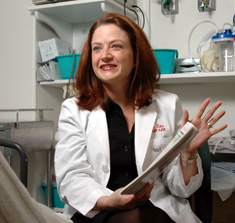

A publication of The Graduate School, University of North Carolina at Chapel Hill
On-Line Version Spring 2005
Home | Back issues | About us | The Graduate School | UNC-Chapel Hill | Make a gift
Pushing the envelope
Carolina women advancing women's health
 |
| Francie Likis, a Royster Fellow in Maternal and Child Health, studies contraception and is a midwife and nurse practitioner. |
Service to women’s health is the core value that motivates Royster Fellow Francie Likis every day of her career as a midwife. Whether it’s delivering babies, conducting research about contraception or teaching her skills to other students, Likis wants to know that she’s contributed something at the end of the day.
Likis, a doctoral student in the School of Public Health, is one of the many women at Carolina who have dedicated their careers to serving the health needs of other women. This dedication is part of what makes the University’s health care graduate programs some of the nation’s best.
“I view my entire career as one of service,” says Likis, “I have had the privilege of serving both patients and students.”
As a midwife, she thinks she provides a unique service to women looking for alternatives to traditional care. “Our care is holistic and education-intensive,” she says. “Midwives provide gynecological care for women throughout their lifetimes, not just during pregnancy and birth.”
Midwives, contrary to some stereotypes, are highly trained health care professionals who provide top notch care. Likis, for example, holds three degrees, has extensive clinical experience, has published in prestigious journals and is co-authoring a textbook, Women’s Gynecological Health.
After completing her degree, she hopes to continue her career of service by practicing midwifery, teaching and doing research on contraception.
Likis says that along with the School of Public Health’s excellent reputation, the support of her Thomas S. and Caroline H. Royster Fellowship was crucial in her decision to attend Carolina. “It has been an extraordinarily generous source of financial support,” she says. “It also has given me opportunities to meet talented individuals with diverse interests throughout the university.”
 |
| Epidemiology
student Emily Harville investigates how a mother’s stress during
pregnancy affects her baby’s health. |
Down the hall in the School’s epidemiology department, Royster Fellow Emily Harville looks for clues in the data of pregnant women at UNC Hospitals. For her dissertation, she is studying whether stress affects blood-flow to the uterus and placenta, ultimately affecting the health of the baby.
“We know that groups of women that are under more stress, such as low-income women or single mothers, have worse birth outcomes like pre-term birth, low birth weight, birth defects and problems during pregnancy,” says Harville, a fifth-year doctoral student. “We’re trying to figure out exactly why that is.”
Harville, who also is supported by a Howard Hughes Medical Institute Predoctoral Fellowship, is proud to have a career that allows her to perform a valuable public service. “I’m fortunate to find a field that uses my skills and interests to serve the public good,” she says. “Improving women’s health during pregnancy is important not only for their own well-being and productivity, but for the health and development of their infants.”
Like many Carolina graduate students, Harville is no stranger to service. After graduating from Oberlin College in Ohio she volunteered for two years with the Peace Corps, working in environmental education and health promotion.
She was drawn to reproductive epidemiology, which is the study of the causes and patterns of disease, by the fact that so little work has been done in such an important field.
“It’s a nice field to be in because there’s still so much we don’t know,” Harville says. “For some of these reproductive problems, we just don’t know any of the answers.”
For Harville, the support of the Royster Fellowship and the Howard Hughes Medical Institute Predoctoral Fellowship has been essential to the development of her career. “The fellowships have given me the flexibility to work on lots of different projects and choose my research instead of being tied down,” she says.
That flexibility is the key to many Carolina women’s abilities to push the boundaries of current knowledge and make important contributions to women’s health.
- Erik Holmes
© 2003, The Graduate School, The University of
North Carolina at Chapel Hill
All text and images are property of The Graduate School
at the University of North Carolina-Chapel Hill. Contact Sandra Hoeflich
at shoeflic@email.unc.edu
to request permission for reproduction.